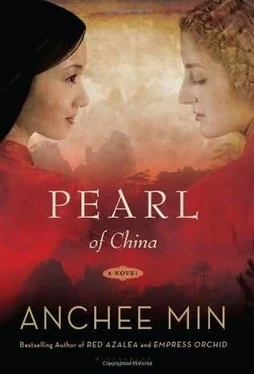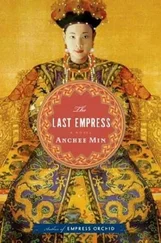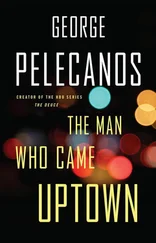I felt lonely and alone after Pearl left. Living in Nanking became difficult. In order to rid the country of the Japanese and the Communists, the Nationalist government increased taxes. To buy a bag of rice, one had to bring three bags of paper money to the store. Dick wrote repeatedly from the Red Base in Yenan, urging me to join him. Finally I made my decision. I let him know that I was ready to be a “bandit’s wife.” Dick was elated. He prepared me for the hostile, unfertile land and the hardship in Yenan.
“Try to look on the bright side,” Dick encouraged. “After all, the first emperor of China was born here two thousand years ago.”
I told Papa that I would worry about him. He told me not to. Before my departure he went back to Chin-kiang. Even Absalom agreed that Papa was a changed man. To redeem himself, Papa had become absorbed in church work. His devotion enabled Absalom to take longer trips inland. During Absalom’s absence, Papa asked Carpenter Chan to build a stained-glass window featuring Jesus Christ for his church. When the work was completed, it delighted everyone. Every morning the sun shone through the glass. Christ looked as though he was floating on top of clouds.
The stained glass boosted attendance. People loved the “Moving Foreign God.” Sunday-morning service became Papa’s showtime. People told Papa that they liked and felt closer to the image of this particular Jesus Christ. Papa was pleased. He had slightly altered Christ’s features. The stained-glass version of Christ had slanting eyes, a flatter nose, and full lips. The Christ also had large earlobes and browner skin.
“This goes to show you that ideas spring fastest from a well-furnished mind!” Papa said proudly.
My daughter was born in a Yenan cave on a snowy day. I tried to find a good name for her but nothing satisfied me. Dick was filled with joy when he held the baby for the first time. “What a beauty!” he exclaimed. “Instead of my lizard eyes and crooked nose, she has her mother’s features: a Chinese princess’s bright almond eyes, a delicate, straight nose, and fine pink lips! What good fortune!”
Dick had been working with Mao’s inner circle. Mao called Dick his secret weapon. Because of Dick, Mao’s image had slowly changed from that of a guerrilla leader to that of a national hero. Through his propaganda, Dick had convinced the masses that Mao, not Chiang Kai-shek, had been fighting the Japanese.
In 1937, Dick’s agents successfully infiltrated Chiang Kai-shek’s organization. Dick was able to persuade several generals of the Nationalist army to join Mao. One general even arrested Chiang Kai-shek. In history this came to be called the Xian Incident.
Mao’s name began to appear regularly in the headlines. Chiang Kai-shek was pressured to invite Mao to talk peace. Dick turned the occasion into a publicity opportunity. The stories he created about Mao made him into a myth.
Dick worked through the night. He composed Mao’s speeches and set up interviews. He often stayed inside a bomb shelter printing leaflets till dawn. Dick put my English to good use. I translated Mao’s articles and mailed them to outside news agencies. These attracted the attention of Western journalists, who came to Yenan seeking private interviews with Mao.
The town of Yenan was no longer a spot on the map no one could find. Yenan was now the headquarters of the nation’s war against Japan. Mao had become an equal to Chiang Kai-shek.
Mao was so pleased that he wrote a poem and dedicated it to Dick. In Chinese tradition, this was the highest honor. Mao’s poem was titled
“In Contrast to Poet Lu You.” As all know, Lu You, born in 1172, wrote the famous lines “With a mountain-high aim, but an old mortal frame.”
Lake Tongting
Lake Green Grass
Near the mid-autumn night
Unruffled no winds pass
Thirty thousand acres of jade light
Dotted with the leaflike boat of mine
The sky with pure moonbeam overflow
The water surface paved with moonshine
Drinking wine from the River West
Using Dipper as our wine cup
Felicity to share with you my friend
No more talk of the bitter Poet Lu You
Brightness above
Brightness below
While life meant hardship for most people in Yenan, Dick and I lived like royalty. We were given one of the best caves for our home. It had two rooms and faced south and was warmed by the sun. We had meat once a week, while the rest ate yam leaves mixed with millet. At first I enjoyed the luxury and Dick’s new status. People came to him at all hours for instructions. But soon I began to resent the intrusions. Sleep was difficult with so much coming and going. I also had trouble reading and writing by candlelight. Dick’s eyesight was so bad he had to wear thick glasses, which enlarged his pupils to the size of mung beans. When Dick took off his glasses at night, his eyes looked like pigeon eggs bulging from their sockets.
Dick didn’t care about his eyes. He wanted me to be more conscientious about his comrades’ political sensibilities. He asked me to hide my bourgeois habits. My desire for privacy, for instance.
“It is ridiculous to call privacy or basic hygiene and love of nature bourgeois habits,” I protested.
The real fight began with naming our daughter. I preferred Little Pearl, but Dick had another idea. He wanted our daughter to be called New Art. By new Dick meant the proletarian art. To create proletarian art was his job for Mao.
Dick decided to take our argument to Mao, who lived three caves down the slope.
Mao was in the middle of studying the French Revolution, but he received us warmly. When asked his opinion regarding our daughter’s name, Mao thought that neither of our choices was good. He took a brush pen and wrote down his choice in red ink.
Thus Rouge Lin was created. It became our daughter’s official name.
I didn’t like the name. Peace and tranquillity were what I had in mind. In Chinese, Rouge meant revolution. The name was associated with violence and blood.
“That’s what we are fighting with, our blood!” Dick quoted Mao. “All the parents living in Yenan give their children revolutionary names: Red Base, Yenan, Bright Future, and Soldier of Mao. Our next generation must carry on the red flag and Communism until…”
“What?”
“Until the world is rouge-in revolution!”
I could take Yenan’s hardship but not the brainwashing. I resented the fact that I was not allowed to even mention the word God. Dick did everything he could to hide the fact that I was a Christian.
“It could cost my job-worse, my life-if you are not careful,” he warned. He asked me to promise to never mention that I knew any foreigners like Pearl and her family. “In Yenan, who one was is more important than who one is,” Dick said. “You must be pure in order to be trusted.”
My daughter was called Comrade Rouge Lin in kindergarten. Like every other toddler, she had to wear the gray, poorly tailored cotton uniform. After she grew out of it, she passed it on to a younger child. Rouge was taught combat skills the moment she learned to walk. Her first spoken line was “I am a brave soldier.” By the time Rouge was two, she could sing “My Red Army Brother Is Coming Back.” She had no interest in learning “Silent Night.” She thought that I was strange and was closer to her father. When she was four, she won a competition reciting Karl Marx’s famous phrase “Capitalism is a greedy monster.”
Although I told Rouge how I grew up and she knew that Pearl Buck was my best friend, she didn’t know any foreigners and never saw anyone dressed differently from herself. Even the way people cut their hair at the Red Base was the same. Everyone was focused on the revolution and nothing else. Rouge’s world was red and white. One was either a comrade or an enemy. By the time she was eight years old, she was clear about who she was and what she wanted to do with her life. She worshipped Mao and wanted to liberate the poor.
Читать дальше












